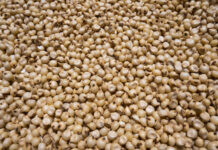
Symphony Environmental is a UK-based company involved in research and development in the field of additives, a substance when added to plastic packaging material makes it biodegradable.
Starting its Indian operations just over a year ago, Symphony Environmental – which operates in over 100 countries and is listed on the London Stock Exchange – is now manufacturing D2W additive grades, used to make biodegradable plastics.
The second technology it works on is D2P, design to protect technologies, which provide functional properties such as antimicrobial and antibacterial treatments. It is of great use in brand packaging and can be used to reduce the use of preservatives by using masterbatches of D2P antimicrobial material while increasing the shelf life of the product.
Symphony also has anti-rodent treatments for wires and cables, anti-fouling masterbatches, and ethylene absorbers, which increase the shelf life of fruits, vegetables, and perishable products by absorbing ethylene.
Symphony Environmental promoted its D2W and D2P additives and 15 other technologies at the PlastIndia exhibition held from 1 – 5 February at New Delhi’s Pragati Maidan. The firm has a distributorship model in India with partners in most parts of India and is rapidly expanding its base.
Packaging is used in all walks of life, and in all kinds of segments such as eCommerce, logistics, spare parts, and white goods. In India, the firm is working with FMCG companies while being actively engaged in discussions with automotive companies, white goods companies, and companies that make BOPP films and all kinds of packaging stuff. “Our canvas is very large and we are trying to tap all these areas one by one,” said Sunil Panwar, CEO – Symphony Environmental India.
On the masterbatches segment in India, he said, “To support the polymer industry for product manufacturing, masterbatches have an immense role to play in terms of providing additives and colors without which a final product can’t take the required shape. I am glad to see more and more dependence regarding this on India. The import of products that you generally get from countries such as China is also reducing. This trend should continue.”
“Modernization is happening and people are starting to invest in newer machinery and technologies. I can give our own example. We were earlier importing materials. Now we have set up operations in India and manufacturing here. Our additives are sold in the form of masterbatches.”
Sustainability agenda
Sustainability is extremely important and on the company’s agenda too. “It is good to know corporates are feeling more and more responsible towards sustainability. It is an approach in which every individual at the consumer level, manufacturers at the production level, and governments at the regulatory level have to work together. We offer solutions by providing additives and specialized chemicals,” he shared.
Panwar said if plastic is recycled, then it is being taken care of and can be converted into useful products for subsequent use. If it is littered, then a cultural change is required. “If we reduce litter and start segregating our waste in our households, it will improve the rate of recycling. If solid waste is segregated, recycling will automatically happen. The problem occurs when wet waste gets mixed with recyclable waste,” he added.
According to Panwar, in India, 60% of consumer plastic waste is recycled while 40% ends up becoming single-use plastic. “We have to reduce that. In case it is discarded, we have designed the product in such a way that it will take care of itself and convert itself into CO2, water, and biomass without affecting the environment and creating any ecotoxicity,” he said.
It is not just the responsibility of any one company or the government or a particular industry to provide technology or a resolution, he added. It is a collective effort where everyone has to work together. We might have to face some inconveniences initially in terms of maintaining sustainability because we are used to living a lifestyle where we have been generating waste. Fortunately in India, per capita waste generation is still low compared to the global average but there is a potential to reduce that, he said.
“Indians, as a community, have had the habit of reusing products since ancient times by preserving and conserving. We should look at our past and learn, and use more biodegradable products. I am in favor of cloth and jute bags so that we use less plastic and generate less waste, even though we are creating a solution to make plastic biodegradable. If one can use a bag multiple times, why not do that rather buying a new one? We should make every effort to increase recycling opportunities by segregating solid waste. A combination of all that will help us as a nation,” he signed off.
IndiFoodBev — authentic, impactful and influential
An English-language food and beverage processing and packaging industry B2B platform in print and web, IndiFoodBev is in its third year of publication. It is said that the Indian food and beverage industries represent approximately US$ 900 billion in revenues which implies more than 20% of the country’s GDP. Eliminating the wastage on the farmside can help to deliver more protein to a higher number of the population apart from generating sizable exports. The savings in soil, seeds, water, fertilizer, energy and ultimately food and nutrition could be the most immense contribution that country is poised to make to the moderation of climate change.
To improve your marketing and grow sales to the food and beverage processing and packaging industry, talk to us. Our research and consulting company IppStar [www.ippstar.org] can assess your potential and addressable markets in light of the competition. We can discuss marketing, communication, and sales strategies for market entry and growth.
Suppliers and service providers with a strategy and budget for targeted marketing can discuss using our hybrid print, web, video, and social media channels to create brand recognition linked to market relevance. Our technical writers are ready to meet you and your customers for content.
The second largest producer of fruit and vegetables in the world is continuously expanding processing capacities and delivery systems with appropriate innovative technologies. We cover product and consumer trends, nutrition, processing, research, equipment and packaging from farm to thali. Get our 2025 media kit and recalibrate your role in this dynamic market. Enhance your visibility and relevance to existing markets and turn potential customers into conversations. Ask for a sample copy of our bi-monthly in print or our weekly IndiFoodBev eZine each Wednesday.
For editorial info@ippgroup.in — for advertisement ads1@ippgroup.in and for subscriptions subscription@ippgroup.in
Naresh Khanna – 10 February 2025
Subscribe Now










